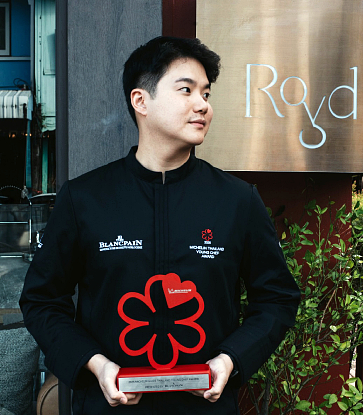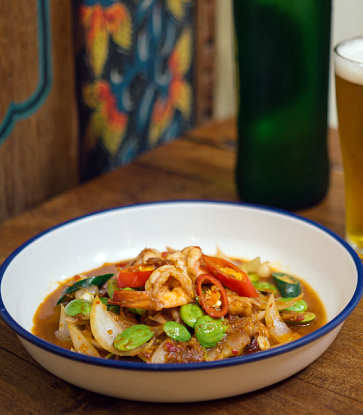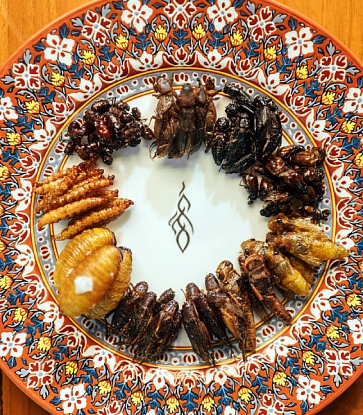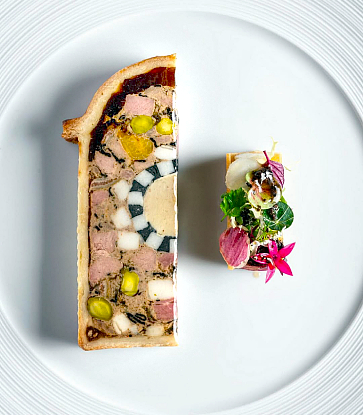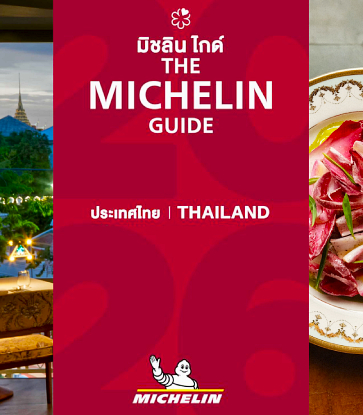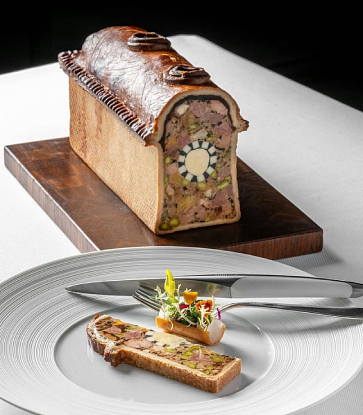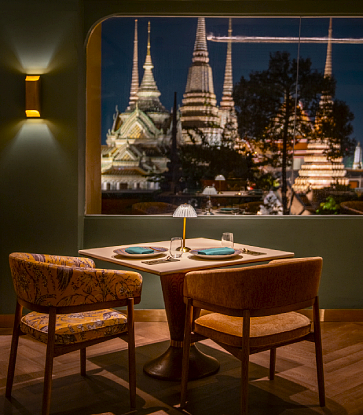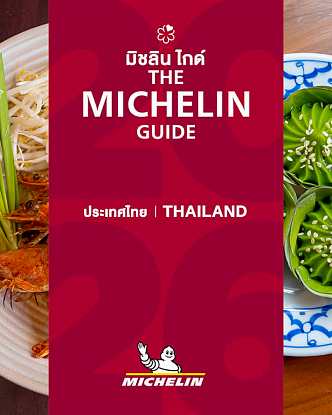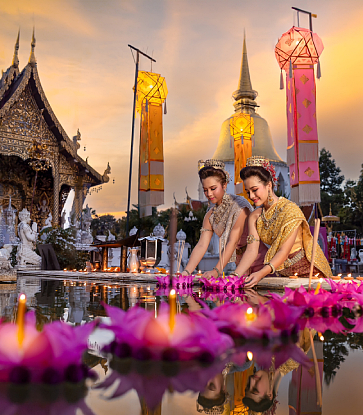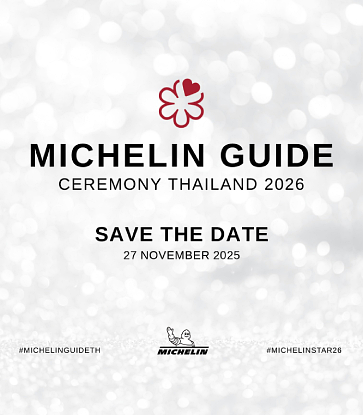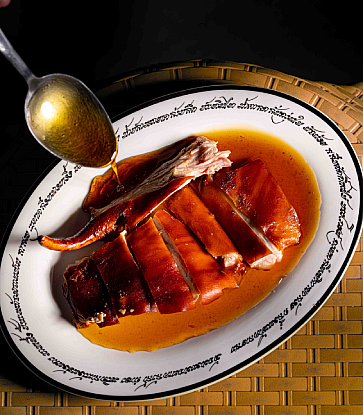An avid walker and a gregarious talker, he navigated an overland route from France to Thailand with just a map and his backpack. Having grown up and studied in Strasbourg in the north of France, he initially cut his chops as a chef before serving wine in some of the country's best MICHELIN Star restaurants.
And since he arrived in Bangkok three years ago, he has transformed the two MICHELIN Starred Mezzaluna's wine cellar at Lebua at State Tower to be the envy of its peers, and he's now considered the best in Thailand.
We met with Guillaume Perdigues, the winner of MICHELIN Guide Thailand's inaugural Sommelier Award, to learn what makes him tipple and the challenges of building a world-class wine cellar in Southeast Asia.

How did you become interested in wine and decide to pursue a career as a sommelier?
“When I was about six or seven, my parents gave me a little bit of wine with water. You don't drink a full glass. They put a bit of sugar in it. They always told me: we want you to drink good quality, not quantity.
“For my first internship, I was 18 years old, and I started as a chef. But I quickly realised it wasn’t not for me; the shouting and working so closely with the same people. It’s a very hot environment. I missed interacting with people on the floor. Since it was a casual place, I was allowed to do different roles, and I quickly realised that selling wine and opening wine was much more fun.”
When were you first aware of the MICHELIN Guide and how much of an influence did it have on you?
“When you're a kid in France, you need to do a 10-day work experience through school. I sent my resume to a restaurant with three MICHELIN Stars, one of the most iconic restaurants. I was nine years old, and I had no idea… but of course they refused. They sent me a very nice letter. Thank you very much, but no.
“My parents wanted me to do a good job, to study engineering, so I did a physics and mathematics degree. Because they thought only poor people do cooking. But I was determined. Before I finished my degree, I was hired at a three MICHELIN Star restaurant. I wanted to work there, especially for the knowledge.”
How much time do you dedicate to research and wine tasting?
“It’s not the same here compared to France. Supplies are hard to manage. When I arrive, I check my email and all the orders. I like to spend at least an hour a day, if I can. When I see suppliers with names I don't know, I research their background. Could it be interesting for us in the future? I research the wineries a lot. If I find it interesting, I call a friend to ask: Have you tried? What do you think?
“I try to see what's going on in the world. Are there any new appellations? Any new regulations coming in? Or new trends I don't know? I try to look at my colleagues in other countries and what they're doing. Could the pairing in Bangkok go the same way? I always try to be one step ahead.
“But a sommelier is not only [about] wine. It’s also whisky. A brand-new thing for me is tequila and mezcal. So, I spend my work time outside studying and drinking mezcal, tequila of different brands asking: what's the idea, the concept, the culture of drinking it?
“Then I like to drink beers, researching the new beers in Thailand. I’m always curious. Even for tea. I have to research a lot about Japanese tea: what is the temperature for brewing and for how long? It’s a science. Often, we meet some Japanese suppliers, who don't speak a word of English. We drink a few sake and understand the rice polishing ratio. It's also a very precise science.”

How do you build and maintain your wine list, and what challenges do you face?
“When I arrived here, we only had three main suppliers. We had to convince our superiors to get more quality. It took me and the team at least two years to get more suppliers in.
“Back in France, it’s very easy. Snap your fingers, a couple of phone calls, and 120 bottles come. Here, I spend all day on the phone. The challenge is how many boxes are available, when will they arrive, because usually the allocation is super small – often just six or 12 bottles. If I put everything on the menu, it will go out of stock very quickly. So I need to do it step by step – smartly.
“Transportation isn’t reliable. Sulphites help the wine to survive, especially shipping to Thailand. If it's shipped in a bad condition, it starts to ferment, and now you have a sparkling red wine because there are no sulphites. It’s the quality at the end that interests me.
“It also took me a while to educate myself about the food here and a year to really understand the style. It's very different from what I've worked with before. Chef Ryuki uses classical French techniques with products I'd never heard of, which makes it very challenging.
“He likes to put a lot of umami into the dishes. The umami texture, the feeling, the flavours: they don’t like the wine so much. So I had to play smart to find the right combinations. At the beginning, the pairing was not very good. It took time to adapt and understand. So, I try to adjust, especially for pairings. Sometimes I buy wine that I will put in my pairing a year or six months later, just because I know the style of Chef Ryuki and I know it will be good next season.
“But honestly, whatever anyone says, if the food is spicy, it’s impossible to taste the true flavour of the wine. The taste buds don’t work when your mouth is burning. With three or four chillies, nothing is good. Not even beer or whiskey.”
How did you feel when you found out you had won the MICHELIN Sommelier Award?
“At the awards ceremony, I was a little bit scared that they would give me the service award. I didn’t know what I would do or say . But it went to someone else and then I knew. Afterwards, I felt super proud. But it doesn't mean I can rest and sleep. No, I have to keep going and keep growing and do far better to work with Chef Ryuki Kawasaki to get three Stars.”

Are there any developments in the world of wine that are particularly interesting?
“The big challenge for the next few decades for winemakers is global warming. It’s changing the planting and harvest times. We see that alcohol level rises in most wines in hot areas. Some whites might lack freshness. Some reds are not ripe yet but are already too high in alcohol. Maybe we will see new wine regions emerging that were too cold before. But in other places, especially in the south of France, Spain, and parts of Italy, it’s getting too hot.
“We have the technology to deal with it. You cannot miss a vintage anymore. But we are all dependent on the weather. So, if it becomes too hot, and you have a grape variety with too high alcohol, it’s a big problem. The winemakers have to put a little bit of chemicals just to save the entire harvest. Of course, if there's too much chemicals, the result cannot be good.”
Any tips for readers looking to improve their wine knowledge?
“In France, we spend 90% of the time reading books. For normal people, who don't want to spend years in the books, take some lessons once a week. To start, read a book about how to make wines. And go to a vineyard, take a tour, and ask them how it works.
“I've been here for three years plus and I see the knowledge going up and up, for Thai and Asian customers in general. The only thing is the food pairing. And that's our job. Books cannot teach you everything. You need to experience it yourself in the restaurant. If you trust the sommelier, take the wine pairing.”
What are your favourite wine and food pairings, and why?
“Wine and cheese is how I started. It can be super precise. It's always the same taste from the same producer. If I find the right wine, it elevates the experience. You have it almost at room temperature, the cheese ready on the plate. You take a piece of bread, some walnuts, and then you watch TV by the fireplace.
“Currently, my favourite is a yellow wine, which has been aged for six years, at room temperature with comte cheese. Now, I have something in the cellar close to vin jaune, and I will put it on the menu in a month and a half. It's not exactly the same, but it’s the same style.”

Can you share any memories you've had as a sommelier?
The best experiences I have had are during my days off with colleagues – going to a winery and meeting some old grumpy guy who is a bit reserved at first. But then you walk to the vineyard together. Sometimes you eat there and have drinks, and they start to talk more. They open some very old bottles from their father before them. As a sommelier, it opens doors for you.
“After you have this relationship, you can tell the story of the wine a little differently. For many wines I have in my cellar at Mezzaluna, I have visited the winemaker. So, I can talk about it more easily. And the customers are very happy to hear about that. When you drink a wine that has a story, you drink it differently. You’re not drinking alcohol but drinking the history or story behind it.”
In February 2019, you and your girlfriend departed Strasbourg on a year-long walking trip through Europe and Asia. We had to ask: Did you drink alcohol and discover any new wines along the way?
“When it's a cold night in a strange place, alcohol is the best way to meet people. As you travel, you're always sharing with families and people help you. When you're in a guesthouse, there are different nationalities. And the more you drink, the easier it is to communicate.
“I think the best wine was in Georgia. It's the cradle of wine making. French people have been producing wine for 2,500 years. In Georgia, it’s 8,000 years. And they all do wine at home. As a visitor, you have to drink. You cannot say no. We drank a lot of vodka and a local Georgian wine. After that, I felt like I could speak Turkish and Russian as well. I had some Assyrian wine – from a region between Iraq, Syria, and Turkey. It uses a grape variety I'd never heard about before. They produce red wine of extremely high quality.”
Where are your personal favourite spots to dine out or wine out in Bangkok?
“Jay Oh, in the student neighbourhood, is open very late [so I can visit after work]. It serves delicious Thai food such as the tom yum mama and the spicy salmon salad. It’s always packed and definitely a must-go for visitors to Bangkok and I take all my family and friends there when they visit.
“Here Hai is a Thai seafood restaurant that I discovered during COVID time. I think it's still my best memory of seafood in Bangkok. At the time there weren’t many customers and the food was incredible – fried rice with crab, mantis with garlic, scallop kaprao. Now it's always so full that people wait in line from the morning.”
Illustration image: © Anuwat Senivansa Na Ayudhya/ MICHELIN Guide Thailand



